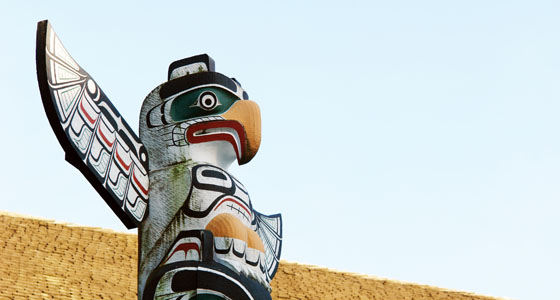
Victory Through Honour totem pole, in front of Brock Hall
The exhibit was designed to show our presence at UBC today, against the backdrop of the contrasting and overlapping national and institutional historical contexts. For example, one of the posters talks about the Victory Through Honour totem pole, which now stands in front of Brock Hall. When Ellen and Ed Neel, and Chief William Scow and his son Alfred of the Kwicksuteinuk First Nation presented the totem pole to UBC at the annual homecoming football game in 1948, traditional practices and ceremonies were still banned for Aboriginal peoples in the Indian Act. This contrast illustrates a key historical moment in UBC’s relationship with Aboriginal communities.
A comprehensive educational resource is currently being developed by CTLT, which delves deeper into the historical moments of UBC’s and Canada’s relationship with Aboriginal peoples. It will allow users to navigate through various key moments in history, and allow them to see these moments not only in multiple historical contexts, but also in a long historical perspective. For example, the timeline shows that while the history of UBC began around the late 1890s, it is preceded by, and embedded in, a long colonial history in Canada. The first Indian Residential School opened in 1620, and the last Residential School only closed in 1996. The ultimate goal of the timeline is to allow UBC community members to see their own presence at UBC today in long and complex historical contexts, and to consider their roles in developing a better future.
This interactive learning tool will provide in-depth resources and guides that can be used in classrooms, and other spaces on campus, to continue the conversations beyond September’s events. Plans are already in the works to offer workshops to introduce the resource to members of the UBC community, and show how the timeline project can be incorporated into courses. Also, the timeline posters, which were created for the TRC, will be circulated around different campus sites in the spring in an effort to keep UBC communities engaged in conversations that started during the TRC.
In addition to the timeline poster exhibition, CTLT will continue to work with faculty who are interested in bringing Indigenous knowledge into their course curriculum. CTLT’s Classroom Climate Series will continue to run throughout the year. The series encourages members of the UBC community to challenge their own assumptions about what they have learned about Aboriginal people, become more critically aware of their teaching and research practices, and learn more about how they engage with topics that challenge their own social location within the institution. Other ongoing projects include the development of an educational film series. The film series talks about the house names in use at Totem Park Residence, and includes members of each of the Indigenous communities the house names were intended to honour. Also, a number of resources are still available for faculty, staff, and students to access on the Indian Residential School Initiative website. Resource guides and a continuum of learning encourage individuals to continue to reflect, share, and actively seek out ways to better understand the history, impact, and legacy that Indian Residential Schools have left. It is important to remember September 18, 2013, as the day that UBC suspended classes in order to understand our responsibility as an educational institution to bring this knowledge forward.
This article was published in the January 2014 CTLT Newsletter, Dialogues. Below is a list of the articles included in the issue:
- CTLT Institute 2014 – Call for Contributions
- Save the Date! STLHE 2015
- Lynda.com Pilot at UBC: Only 8 Weeks of Unlimited Online Learning Access Left
- Truth and Reconciliation at UBC: Engaging Biology Students with the TRC
- Truth and Reconciliation at UBC: Continuing the Conversation (currently viewing)
Find out more information about the CTLT Newsletter, Dialogues.

